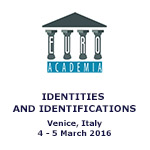Euroacademia Conferences
 Europe Inside-Out: Europe and Europeanness Exposed to Plural Observers (9th Edition) April 24 - 25, 2020
Europe Inside-Out: Europe and Europeanness Exposed to Plural Observers (9th Edition) April 24 - 25, 2020 Identities and Identifications: Politicized Uses of Collective Identities (9th Edition) June 12 - 13, 2020
Identities and Identifications: Politicized Uses of Collective Identities (9th Edition) June 12 - 13, 2020 8th Forum of Critical Studies: Asking Big Questions Again January 24 - 25, 2020
8th Forum of Critical Studies: Asking Big Questions Again January 24 - 25, 2020 Re-Inventing Eastern Europe (7th Edition) December 13 - 14, 2019
Re-Inventing Eastern Europe (7th Edition) December 13 - 14, 2019 The European Union and the Politicization of Europe (8th Edition) October 25 - 26, 2019
The European Union and the Politicization of Europe (8th Edition) October 25 - 26, 2019 Identities and Identifications: Politicized Uses of Collective Identities (8th Edition) June 28 - 29, 2019
Identities and Identifications: Politicized Uses of Collective Identities (8th Edition) June 28 - 29, 2019 The European Union and the Politicization of Europe (7th Edition) January 25 - 26, 2019
The European Union and the Politicization of Europe (7th Edition) January 25 - 26, 2019 7th Forum of Critical Studies: Asking Big Questions Again November 23 - 24, 2018
7th Forum of Critical Studies: Asking Big Questions Again November 23 - 24, 2018 Europe Inside-Out: Europe and Europeanness Exposed to Plural Observers (8th Edition) September 28 - 30, 2018
Europe Inside-Out: Europe and Europeanness Exposed to Plural Observers (8th Edition) September 28 - 30, 2018 Identities and Identifications: Politicized Uses of Collective Identities (7th Edition) June 14 - 15, 2018
Identities and Identifications: Politicized Uses of Collective Identities (7th Edition) June 14 - 15, 2018
Intellectuals, Ethnicity, and Nationalism: Evidence from Catalonia
-
-

-
Presentation speakers
- Yannis Karagiannis, Institut Barcelona d'Estudis Internacionals, Spain
Abstract:
Social scientists have long recognized the role of intellectuals in generating and/or supporting nationalist ideals (Anderson 1983; Benda 2006[1927]; Gellner 1987; Guibernau 1999; Ory and Sirinelli 1986; Smith 1971). But how do intellectuals think about nationalism when that becomes a seriously divisive issue? Do they all converge towards the same view, or is there a polarization of expert opinion? If, as it seems to be the case, there is polarization, what factors explain each individual intellectual’s choice? Are these factors different from those affecting supposedly less thoughtful citizens, or are intellectuals driven by the same ’irrational’ passions as everybody else? To answer these questions, this paper draws on two literatures: the sociology of intellectuals, and the political behavior scholarship on nationalism; it then tests the resulting hypotheses using a custom-made survey of tenured professors of economics, history, international relations, law, philosophy, political science, and sociology in Catalonia. Our results show that, far from seeking to appease passions, intellectuals are more polarized than the wider public. More worryingly, we find that intellectuals are, like the general public, largely motivated by ethnic considerations.
-
Related Presentations














